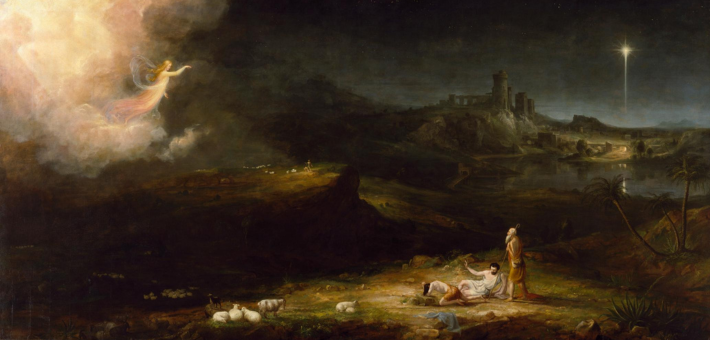Commentary on Luke 2:1-14 [15-20]
In the book Overload: Finding the Truth in Today’s Deluge of News, trusted news journalist Bob Schieffer argues that we live in an age of information overload. As his book’s subtitle suggests, our age faces a “deluge of news.” In addition to having a regular diet of printed news outlets, we now have 24-hour news cycles produced by cable TV, and we are bombarded by YouTube news videos and news websites because of the advancement of digital technology. The present surfeit of news, though, does not mean all news is good news.
What then might be the criteria for good news? Is not the answer to this question nestled somewhere in the fuller account of the Lukan nativity story (which gives us the source of good news, 2:1–7; the sharing of good news, 2:8–14; and the search or quest to become witnesses or agents of good news, 2:15–20)? Can we not find the criteria for good news lodged in the words of the unidentified heavenly angel (or messenger), whom Luke places among a long litany of persons telling good news in the Gospel of Luke and the book of Acts?
Yes, the angel of 2:8–14 is one messenger in a stream of good-news tellers—from Gabriel (1:19) to John the Baptist (3:18) and Jesus (4:18, 43; 7:22; 8:1; 9:6; 16:16; 20:1) and on to Jesus’ successors in Acts (5:42; 8:4, 12, 25, 35, 40; 10:36; 11:20; 13:32; 14:7, 15, 21; 15:35; 16:10). So, given this stream of Lukan good-news tellers, how might we identify good news?
First, good news is relevant news (news we can use “today,” right now). The heavenly messenger shared good news about a Savior who was born that day (“today,” 2:11). Across the Lukan Gospel’s narrative landscape, of course, the narrator frequently repeats the word “today” (Greek sēmeron, 4:21; 5:26; 19:5, 9; 23:43) because Luke has no interest in telling news that does not have utility, news that does not address real needs, news that the people of that time could not use.
So, to the struggling village of Nazareth, Jesus says, “Today the scripture [from Isaiah] has been fulfilled” (4:21). Also, the Capernaum crowd, excited about the healing of a man with paralysis, declared, “We have seen strange things today” (5:26). Then, in front of the home of Zacchaeus, a man Jesus reclaimed as a child of Abraham, Jesus declared, “Today salvation has come to this house” (19:9). Later, a dying Jesus says to a penitent man who had spoken up for him, “Today, you shall be with me in paradise” (23:4).
Immediacy abounds. The focus is on today. The good news is relevant news. It’s news we can use right now: today.
Second, good news is also reliable news (verifiable, trustworthy news). Have you ever wondered whether the shepherds would have fulfilled their quest to find the Savior and thus to become witnesses of the same good news they were told if the angel had given them misleading, deficient, and obfuscating news?
Well, we would do well to remember that in the Lukan account of the nativity, the ragtag band of shepherds had nothing extra to help them find their way to the Savior. Unlike the wise men from Matthew’s Gospel, the shepherds did not have a star to guide them to the infant-child nor a dream to help them make wise decisions after seeing the Savior. Rather, they had a solitary sign—a reliable piece of news from the angel.
I do not know how long the shepherds looked for the infant-child, but they kept looking until they found that solitary sign—that feeding trough (not the “bands of cloth” because such bands were used to keep every baby’s limbs straight). The feeding trough, the sign that the Savior was born in the thickets of poverty, was not only something the angel mentioned once (2:12) but—for us—something the narrator mentions twice (2:7, 16). Equipped with reliable news, the shepherds were able to fulfill their quest.
Of course, the burden upon us who live in what is often called a post-truth age is also to tell reliable news. In a world marked by deceptive news, let us be as vigilant with our own brand of news, and let us join in the fight to separate fact from fiction, truth from lies, and information from disinformation (the deliberate distortion of truth through erasure and disparagement). What happens if our news is not reliable? What happens if others depend on the veracity of our news to help them in their own quests to find and become witnesses of truth? The news, if it is good news, must be reliable.
Finally, good news is also retellable news (news worth retelling to others), in a cycle of responses that will end with praise to the God who has made the good news possible. Some news, of course, is not worth retelling—the news that stokes resentment, the news that normalizes hate speech, the news that spreads misogyny, the news that diminishes the humanity of others.
In the case of the Lukan nativity story, however, here is what happens. After the shepherds found the Savior, they began to retell what they had been told (with the result that some persons were amazed and Mary pondered everything in her heart [2:17–19], and with the result that the shepherds “returned, glorifying and praising God” [2:20]). Evidently the angel’s good news rings across the centuries because messengers are still retelling that early good news even today.
Will you therefore join a chorus of good-news tellers from Gabriel and the unidentified angel, and from Jesus’ prophetic movement to contemporary messengers? Will you offer relevant, reliable, and retellable news in our own contemporary world? If our news-telling truly brings glory and praise to God, it will not just be news. It will be good news. Have you heard good news lately? Are you telling any?


December 24, 2024